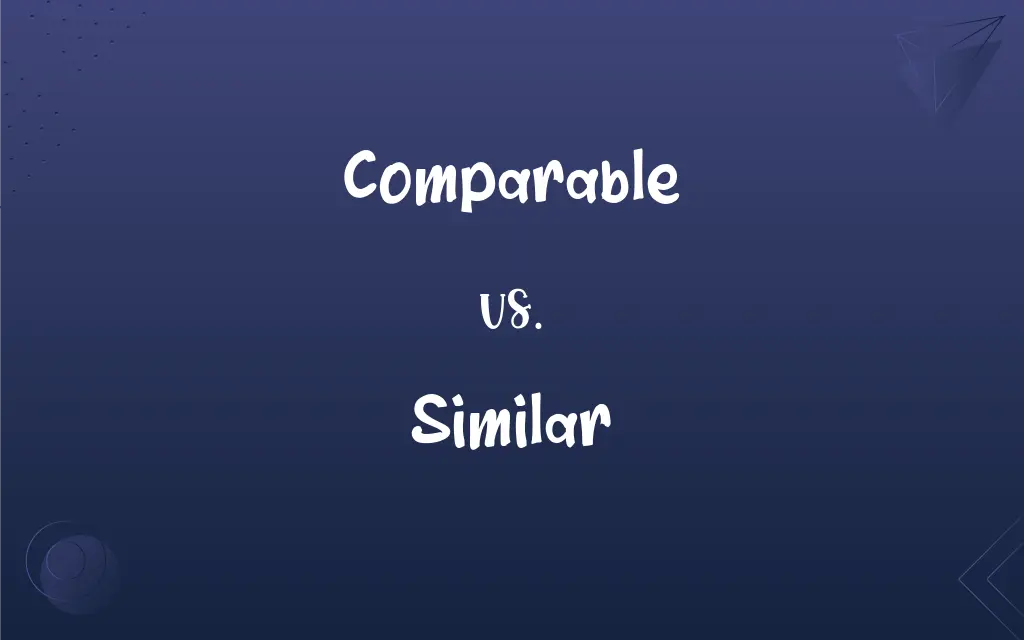Comparable vs. Similar: What's the Difference?
By Harlon Moss || Updated on May 24, 2024
"Comparable" means capable of being compared due to having similarities, while "similar" means having a resemblance or likeness.

Key Differences
"Comparable" refers to things that can be evaluated against each other due to having enough in common, often used in contexts where a detailed assessment or comparison is possible. "Similar," on the other hand, means having a resemblance or likeness, indicating that two or more things share characteristics but without the implication of a detailed comparative analysis.
"Comparable" often implies a degree of equivalence in key aspects, making the comparison meaningful and worthwhile. "Similar" suggests a general likeness without necessarily being on par in terms of importance or value.
"Comparable" is typically used in analytical or evaluative contexts where the goal is to determine equivalence or difference in specific criteria. "Similar" is used in descriptive contexts to indicate a general likeness or shared attributes.
Using "comparable" often suggests that a more in-depth analysis or comparison is possible or necessary, whereas "similar" is used to indicate a more superficial or general resemblance.
Comparison Chart
Definition
Capable of being compared due to similarities
Having a resemblance or likeness
ADVERTISEMENT
Implication
Detailed assessment or comparison
General likeness without detailed comparison
Usage Context
Analytical or evaluative contexts
Descriptive contexts
Degree of Likeness
Suggests key aspects are equivalent or noteworthy
Indicates general shared attributes
Analytical Depth
Implies potential for in-depth analysis
Implies surface-level resemblance
Comparable and Similar Definitions
Comparable
Capable of being compared meaningfully.
The two products are comparable in terms of quality.
ADVERTISEMENT
Similar
Sharing characteristics or qualities.
Their viewpoints are similar on many issues.
Comparable
Having enough similarities to warrant comparison.
Their academic achievements are comparable.
Similar
Having a likeness or resemblance.
The twins have similar features.
Comparable
Suitable for a detailed comparison.
These two cases are comparable and can be analyzed together.
Similar
Not exactly the same but alike in many ways.
The two paintings are similar in style.
Comparable
Worthy of comparison due to significant commonalities.
The cities are comparable in size and population.
Similar
Bearing a likeness in some respects.
The climate in both regions is similar.
Comparable
Admitting of comparison with another or others
“The satellite revolution is comparable to Gutenberg's invention of movable type” (Irvin Molotsky).
Similar
Indicating a general resemblance.
The recipes are similar but not identical.
Comparable
Similar or equivalent
Pianists of comparable ability.
Similar
Having a resemblance in appearance or nature; alike though not identical.
Comparable
(often with to) Able to be compared (to).
An elephant is comparable in size to a double-decker bus.
You can't say that robbing a bank is like pickpocketing. The two are just not comparable.
Similar
(Mathematics) Having corresponding angles equal and corresponding line segments proportional. Used of geometric figures
Similar triangles.
Comparable
(often with to) Similar (to); like.
Similar
Having traits or characteristics in common; alike, comparable.
My new car is similar to my old one, except it has a bit more space in the back.
Comparable
(mathematics) Constituting a pair in a particular partial order.
Six and forty-two are comparable in the divides order, but six and nine are not.
Similar
(mathematics) Of geometrical figures including triangles, squares, ellipses, arcs and more complex figures, having the same shape but possibly different size, rotational orientation, and position; in particular, having corresponding angles equal and corresponding line segments proportional; such that one can be had from the other using a sequence of rotations, translations and scalings.
Comparable
(grammar) Said of an adjective that has comparative and superlative forms.
"Big" is a comparable adjective, since it can take the forms "bigger" and "biggest"; but "unique" is not comparable, except in disputed, but common, usage.
Similar
Of two square matrices; being such that a conjugation sends one matrix to the other.
Comparable
Something suitable for comparison.
Similar
That which is similar to, or resembles, something else, as in quality, form, etc.
Comparable
Capable of being compared; worthy of comparison.
There is no blessing of life comparable to the enjoyment of a discreet and virtuous friend.
Similar
(homeopathy) A material that produces an effect that resembles the symptoms of a particular disease.
Comparable
Able to be compared or worthy of comparison
Similar
Exactly corresponding; resembling in all respects; precisely like.
Comparable
Conforming in every respect;
Boxes with corresponding dimensions
The like period of the preceding year
Similar
Nearly corresponding; resembling in many respects; somewhat like; having a general likeness.
Comparable
Equivalent or similar in value or importance.
The job offers are comparable in terms of salary and benefits.
Similar
Homogenous; uniform.
Similar
That which is similar to, or resembles, something else, as in quality, form, etc.
Similar
Marked by correspondence or resemblance;
Similar food at similar prices
Problems similar to mine
They wore similar coats
Similar
Having the same or similar characteristics;
All politicians are alike
They looked utterly alike
Friends are generaly alike in background and taste
Similar
Resembling or similar; having the same or some of the same characteristics; often used in combination;
Suits of like design
A limited circle of like minds
Members of the cat family have like dispositions
As like as two peas in a pod
Doglike devotion
A dreamlike quality
Similar
(of words) expressing closely related meanings
Similar
Capable of replacing or changing places with something else;
Interchangeable parts
FAQs
Can "comparable" be used to imply equality?
Yes, "comparable" often suggests that things are of similar value or importance.
What does "comparable" mean?
"Comparable" means capable of being compared due to having similarities.
Is "similar" used for detailed comparisons?
No, "similar" indicates general likeness without implying a detailed comparison.
In what contexts is "comparable" commonly used?
"Comparable" is used in analytical or evaluative contexts to assess equivalence.
When should I use "similar"?
Use "similar" to describe a general resemblance or likeness between things.
Does "similar" imply exactness?
No, "similar" implies likeness but not exactness.
Is "similar" more about appearance or function?
"Similar" can refer to both appearance and function, indicating a general likeness.
What does "similar" mean?
"Similar" means having a resemblance or likeness.
Can "comparable" items be different in some ways?
Yes, comparable items can differ in some aspects but have significant commonalities.
Is "similar" a stronger term than "comparable"?
No, "comparable" often implies a stronger degree of likeness suitable for comparison.
Can "comparable" items vary in minor details?
Yes, comparable items can have minor differences but should be similar in key aspects.
Can "comparable" be used for qualitative assessments?
Yes, "comparable" is often used to compare qualitative aspects like quality or performance.
Does "comparable" suggest a thorough analysis?
Yes, "comparable" suggests that a detailed comparison is possible or necessary.
Can two things be "comparable" without being "similar"?
No, things must be similar in some respects to be considered comparable.
How does "similar" relate to equivalence?
"Similar" indicates likeness without necessarily implying equivalence in value or importance.
Are "comparable" and "similar" synonyms?
They are related but not synonymous; "comparable" implies a potential for detailed comparison, while "similar" indicates general likeness.
Can products be both "comparable" and "similar"?
Yes, products can be described as both comparable and similar if they share significant features and value.
How does context affect the use of "comparable" and "similar"?
Context determines whether a detailed assessment ("comparable") or a general description ("similar") is appropriate.
Is "similar" limited to physical characteristics?
No, "similar" can refer to both physical characteristics and abstract qualities.
Can "similar" be used to describe identical items?
No, "similar" is used when items are alike but not identical.
About Author
Written by
Harlon MossHarlon is a seasoned quality moderator and accomplished content writer for Difference Wiki. An alumnus of the prestigious University of California, he earned his degree in Computer Science. Leveraging his academic background, Harlon brings a meticulous and informed perspective to his work, ensuring content accuracy and excellence.































































